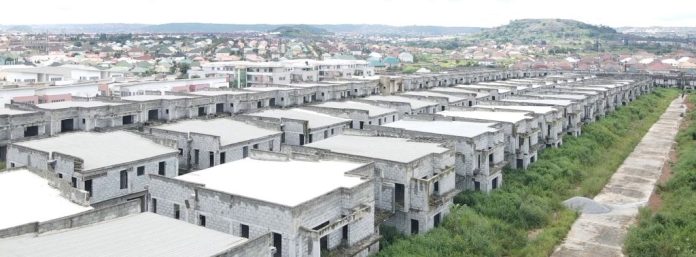The Economic and Financial Crimes Commission (EFCC) has responded to criticisms regarding its recent recovery of 753 duplexes and apartments on Plot 109, Cadastral Zone C09, Lokogoma District, Abuja, following the final forfeiture granted by the Federal Capital Territory High Court on December 2, 2024.
The Commission, in a statement titled “Sowore and Co-Travellers’ Tantrums Against EFCC’s Landmark Recovery”, expressed displeasure over allegations of a cover-up concerning the identity of those behind the estate. It clarified that the forfeiture proceedings were conducted under the Advance Fee Fraud Act, emphasizing an in-rem approach that focuses on properties rather than individuals. The EFCC stated:
“The substantive criminal investigation on the matter continues. It would be unprofessional of the EFCC to prematurely mention names not directly linked to any title documents of the properties. Our no-sacred-cow approach remains intact.”
Head of Media and Publicity, Dele Oyewale, further chided activist Omoyele Sowore, accusing him of failing to appreciate the systemic challenges that enabled such alleged corruption.
Sowore, however, fired back, describing the EFCC’s statement as “reckless and irresponsible.” Taking to social media, the activist shared court documents and affidavits that, according to him, contradict the EFCC’s narrative.
“The EFCC’s assertion is a deliberate attempt to whitewash the truth. Evidence from court proceedings explicitly names individuals, including former CBN Governor Godwin Emefiele, as central figures in this real estate fraud. I will let the public decide who is covering up for whom.”
Among the documents Sowore released is an affidavit signed by EFCC investigator Idi Musa, which links the estate to funds allegedly acquired through kickbacks and foreign exchange allocations during Emefiele’s tenure at the Central Bank of Nigeria. The affidavit highlights roles played by senior CBN officials and accomplices, including Ifeanyi Omeke, a Zenith Bank executive accused of facilitating property acquisitions.
Court Documents Shed Light
The affidavit, part of Suit No: FHC/HC/M/14519/2024, details how:
Properties linked to unlawful activities were traced to Emefiele and associates.
Kickbacks from foreign exchange allocations and contract awards funded the estate.
Title documents for several properties were recovered from Omeke’s office, corroborating the allegations.
The EFCC maintains that its decision to focus on the property instead of individuals aligns with legal procedure but assures that criminal investigations into the matter remain active.
The controversy has sparked debates over transparency and accountability in high-profile anti-corruption cases. While some citizens commend the EFCC for the recovery, others, like Sowore, demand clearer action against individuals implicated in the investigations.
The unfolding drama between the EFCC and Sowore underscores the complexities of tackling systemic corruption in Nigeria, with many calling for more robust measures to ensure justice and transparency.
As the EFCC continues its investigation, Nigerians await further revelations that may illuminate the web of corruption allegedly tied to the estate.



